Q-Space Read online
Page 4
He settled into his chair, resting his weight against the brown vinyl cushions. All around him, the bridge crew manned their stations; anticipating a straightforward cruise through safe territory, he had chosen to give some of the newer crew members opportunities for valuable bridge experience. On the main viewer at the front of the bridge, stars zipped by at warp five, the maximum speed recommended by Starfleet for non-emergency situations. The familiar hum of ordinary bridge operations soothed his ears. So far, it appeared, their voyage to the edge of the galaxy held few surprises. “No Borg, no Romulans, no space-time anomalies,” he commented. “A nice, quiet trip for a change.”
“Knock on wood,” Riker said with a grin. He glanced around the gleaming metallic bridge. “If you can find any, that is.”
“A bit on the dull side, if you ask me,” Lieutenant Baeta Leyoro said. The new security officer had joined the ship at Auckland Station. She had previously served aboard the Jefferson and the Olympic and came highly recommended. Picard had reviewed her file thoroughly before approving her for the post aboard the Enterprise; the imposing, dark-haired woman had fought in the brutal Tarsian War in her youth, enduring psychological and biochemical conditioning to increase her fighting skills, before leaving Angosia III and joining Starfleet. In theory, the victorious Angosians had, rather tardily, reconditioned its veterans to peacetime, but how effective that reconditioning was remained open to debate; could any treatment truly undo the hardening effects of years of bloody conflict? Picard found Leyoro’s personality slightly abrasive, but that was often the case with the best security officers. Aggressiveness, along with a manageable dose of paranoia, seemed to come with the job. Just look at Worf, he thought, or even the late Tasha Yar.
“On the Enterprise,” he replied to Leyoro, “one learns to appreciate the occasional dull patch…as long as they’re not too long.”
“If you say so, sir,” she said, sounding unconvinced. Her jet-black hair was braided into a long plait that hung halfway down her back. She patted the type-1 phaser affixed to her hip. “I wouldn’t want to get too rusty.”
“No danger of that, Lieutenant,” Riker promised her.
Indeed, Picard thought. On this mission alone, the galactic barrier was nothing to take lightly. The real danger would not begin until they arrived at their destination. “Ensign Clarze,” he addressed the pilot at the conn station, a young Deltan officer fresh out of the Academy. “How much longer to the edge of the galaxy?”
Clarze consulted his display panel. Like all Deltans’, his skull was completely hairless except for a pair of light blond eyebrows. “Approximately seventy-five hours,” he reported promptly.
“Very good,” Picard remarked. They were making good time; with any luck, Geordi and Lem Faal should be about ready to commence the experiment by the time they arrived at the barrier. Picard contemplated the viewscreen before him, upon which the Federation’s outmost stars raced past the prow of the Enterprise. The galactic barrier was still too far away to be visible, of course, but he could readily imagine it waiting for them, marking the outer boundaries of the Milky Way and standing guard over perhaps the most infinite horizon of all. He felt like Columbus or Magellan, prepared to venture beyond the very edge of explored space. Here there be dragons, he thought.
A sudden flash of white light, appearing without warning at the front of the bridge, interrupted his historical ruminations. Oh no, he thought, his heart sinking. Not now!
He knew exactly what that brilliant radiance foretold, even before it blinked out of existence, leaving behind a familiar personage in front of the main viewer. “Q!” Picard blurted. Beside him, Will Riker jumped to his feet while gasps of surprise and alarm arose from the bridge crew, many of whom had never personally encountered the infamous cosmic entity before.
Standing stiffly at attention before them all, Q was costumed even more colorfully than usual. For some reason that Picard could only hope would become evident, their unexpected visitor had assumed the traditional garb of a Royal Guard at Buckingham Palace, complete with a towering helmet of piled black fur and a crisp red uniform adorned with golden buttons and insignia. A white diagonal sash completed the outfit, along with a sturdy iron pike that he grasped with both hands. He held the pike crosswise before his chest, as though barring them from the stars that streaked by on the screen behind him. “Who goes there?” he intoned ominously.
Picard rose from his chair and confronted his bizarrely attired adversary. “What is it, Q? What are you up to this time?”
Q ignored his queries. He kept his expression fixed and immobile, devoid of his customary smirk, like one of the guards he emulated. “What is your name?” he demanded in the same stentorian tone. “What is your quest?”
Picard took a deep breath, determined not to let Q get under his skin the way he invariably did. Even though he had encountered Q on numerous occasions in the past, he had never devised a truly satisfactory strategy for dealing with the aggravating and unpredictable superbeing. The sad fact of the matter, he admitted silently, was that there was really no way to cope with Q except to wait for him to tire of his latest game and go away. No power the Federation possessed could make Q do anything he didn’t want to. Picard liked to think that he had scored a moral victory or two against Q over the years, but here Q was again, ready to try Picard’s patience and torment the Enterprise one more time. It’s been over two standard years since his last escapade, he thought, remembering the disorienting trip through time that Q had subjected him to the last time he intruded into their lives. I should have known our luck was due to run out.
“What is your quest?” Q repeated. He spun the pike upward and rapped the bottom tip of the iron spear against the duranium flooring, producing an emphatic clang that hurt Picard’s ears.
“You know full well who we are and why we’re here,” he declared. “State your business.”
Q’s frozen features relaxed into a look of weary annoyance. “Some people have no respect for the classics,” he sighed in something closer to his usual voice. He clicked his tongue and the pike disappeared in another blinding burst of light. “Really, Jean-Luc, would it have killed you to play along?”
“No games, Q,” Picard insisted. “What do you want?”
Q clutched his hands to his heart, feigning a look of aghast horror. “No games? Why, mon capitaine, you might as well ask a sun not to blaze or a tribble not to multiply.” He glanced at ship’s first officer, poised beside his captain. “Oh, do sit down, Riker, you’re not impressing anyone with your manly posing. Except maybe the counselor, that is, and even she can see right through you.” He snapped his fingers and Riker was suddenly back in his chair, without having moved a muscle himself. He glared at Q with a ferocity that was nearly Klingon in its intensity, while Troi looked like she would rather be anywhere else.
Why me? Picard thought. Q seemed to take peculiar delight in afflicting him. “You don’t need to show off your powers to us,” he said calmly, making what he knew would be a futile attempt to reason with the vainglorious demigod. “We are fully aware of your capabilities.” And then some, he added mentally. “I am quite busy with other matters. For once, can’t you get straight to the point?”
Q looked back and forth before replying, as if disinclined to be overheard. “Permit me to fill you in on a little secret, my impatient friend. When you can do anything, nothing is more boring than simply doing it. Getting there isn’t half the fun, it’s the whole enchilada.” He winked at Picard and a drippy Mexican entrée appeared in the captain’s hand. “Care for one?”
Picard handed the enchilada back to Q and wiped his greasy fingers on his trousers. He could feel his blood pressure rising at a rate that would surely distress Dr. Crusher. “No, thank you,” he said coldly, his temper ascending toward its boiling point. No matter how many times it happened, he could never get used to being made a fool of in front of his crew.
“Your loss,” Q said with a shrug, taking a bite from the snack. “Ah, hot and spicy. Re
minds me of a supernova I ignited once.” Another thought apparently occurred to him and his looming black hat went away. He casually scratched a tuft of unruly brown hair. “Enough of that. It was starting to itch like the devil.”
The greatest challenge in dealing with Q, Picard reminded himself, was keeping in mind just how dangerous he could be. Q’s antics could be so ludicrous on the surface that it was easy to forget the very real damage he could cause. Whenever Q appeared, Picard made a point of remembering that Q’s idea of fun-and-games had already cost the lives of at least eighteen crew members. Q hadn’t killed those men and women himself, of course, but he had been perfectly willing to throw the entire ship into the path of the Borg merely to make a point to Picard. Never again, Picard vowed. He’d be damned if he’d let Q sacrifice another human life on the altar of his omnipotent ego.
But how did you impose limits on a god?
Lieutenant Leyoro looked ready to try. She had drawn her phaser on Q the moment he appeared, but, to her credit, she had not attempted anything rash. No doubt she was familiar with Q’s history from the ship’s security logs. “Captain,” she inquired, never taking her eyes off Q, “shall I take the intruder into custody?”
Picard shook his head. Why endanger Leyoro with such a pointless exercise? “Thank you, Lieutenant, but I’m afraid that Q is more like an unwanted guest, at least for the time being.”
“Your hospitality simply overwhelms me, Jean-Luc,” Q remarked sarcastically before turning his gaze on Lieutenant Leyoro. “I see there have been some improvements made.” He sniffed the air. “Could it be I no longer detect the barbaric aroma of the ever-feral Mr. Woof?”
“Lieutenant Commander Worf,” Picard corrected him, “has accepted a position on Deep Space Nine.”
“And good riddance, I say,” Q said. A scale model of Deep Space Nine appeared in front of him, floating at just below eye level. Q stuck the soggy remains of his enchilada onto one of the miniature docking pylons. Tabasco sauce dripped onto the habitat ring. “I visited that dreary place once. What a dump! I couldn’t wait to leave.” He waved his hand and both the station and the discarded meal vanished.
“That’s not the way I heard it,” Picard retorted. Naturally, he had carefully studied all of Q’s reported appearances throughout the Federation. “According to Captain Sisko’s log, he punched you in the jaw and you never came back.” He contemplated his own knuckles speculatively. “Hmmm, perhaps I should have simply decked you years ago.”
“I’d be happy to take a crack at it,” Riker volunteered.
“Oh, please!” Q said, turning his eyes heavenward but taking a few steps backward. “Really, Picard, with all of creation within my reach, why would I ever return to that woebegone sinkhole of a station? They can’t even get rid of the voles.”
Despite a strong temptation to argue the point, Picard refrained from defending Deep Space Nine. He couldn’t expect so flighty a creature as Q to understand all that Benjamin Sisko and his officers had accomplished there over the last several years. He felt a stab of envy, though; Sisko had only the Dominion and the Cardassians to deal with, not a nattering narcissist whose delusions of godhood didn’t even have the decency to be delusions. I wonder if Sisko would be willing to trade the Jem’Hadar for Q? he thought. Picard would take that deal in a Scalosian second.
“Still, I must congratulate you, Jean-Luc,” Q persisted, “in unloading that Klingon missing link. I’m sure he’ll fit in perfectly, in a depressingly ‘honorable’ sort of way, with all the other malcontents and misfits on that station.” In the blink of an eye, he teleported from the front of the bridge to the tactical station behind Riker’s chair.
“Enchanté, mademoiselle,” he cooed at Baeta Leyoro, taking her hand and raising it to his lips. “No doubt you have heard nothing but the most extravagant praise of me.”
Leyoro yanked her hand back in a hurry. “Listen,” she snarled, “I don’t care how powerful you’re supposed to be. Touch me again and I’ll personally send a quantum torpedo up your—”
“Charmed,” Q interrupted. He strolled away from the tactical station, taking the long way around the starboard side of the bridge. “Reminds me rather of the late Natasha Yar. Do try to take better care of this one, Jean-Luc.”
Picard seethed inwardly. How dare Q make light of Tasha’s tragic death? What did an immortal being even know about the pain and loss associated with mortality? “That’s enough, Q,” he began, barely reining in his anger.
But Q had already discovered another target. He cocked his head in Data’s direction. “What? Can it be true? Did I actually detect a pang of genuine grief from your positronic soul when I mentioned the unfortunate Lieutenant Yar?” Q wandered over to Ops and eyed the android quizzically. Data met his frank curiosity with no visible signs of discomfort.
“Perhaps you are referring to the proper functioning of my emotion chip,” he suggested helpfully.
“Indeed I am,” Q affirmed, carefully inspecting Data’s skull. He crouched down and peered into one of the android’s synthetic ears. A beam like a penlight shot from Q’s index finger. For a second, Picard feared that Q would simply take Data apart to inspect the chip more closely, but then Q straightened up and stepped away from Data’s station. “So the Tin Man finally found a heart…of a sort.”
“That’s enough, Q,” Picard said forcefully, “and this ‘friendly’ reunion has gone on long enough. If you refuse to enlighten us as to the purpose of this visitation, then I see no choice but to get on with our business regardless of your presence.” He returned to his chair with every appearance of having dismissed Q from his consciousness, then decided to check on the status of Geordi and Lem Faal’s efforts to prepare for the experiment. He tapped his combadge. “Picard to Engineer—”
Q would not be so easily dismissed. Picard’s badge vanished from his chest, reappearing briefly between Q’s thumb and index finger before he popped the stolen badge into his mouth and swallowed. “Delicious,” he remarked. “Not quite as filling as freshly baked neutronium, but a tasty little morsel nonetheless.”
“Q,” Picard said ominously as Riker handed Picard his own badge. “You are trying my patience.”
“But, Jean-Luc, I haven’t even remarked yet on your spanking new Enterprise.” He sauntered around the bridge, running a white-gloved finger along the surface of the aft duty stations and checking it for dust. “Did you think I wouldn’t notice that you’ve traded up?” He wandered over to the illuminated schematic of the Enterprise-E on display at the back of the bridge. “Very snazzy and streamlined, but somehow it lacks the cozy, lived-in quality the old place had. Whatever happened to that bucket of bolts anyway? Don’t tell me you actually let Troi take the helm?”
Deanna gave Q a withering look, worthy of her formidable and imperious mother, but otherwise declined to rise to Q’s bait. “Very well, Q,” Picard said, “it’s obvious you’ve been keeping tabs on us. Now if you don’t mind, we have an urgent mission to complete.” He started to tap his badge once more, wondering if Q would let him complete his call to Geordi.
Of course not.
“Oh, that’s right!” Q said, slapping his forehead. “Your mission. However could I have forgotten? That’s why I’m here, to tell you to call the whole thing off.”
“What?” Picard hoped he hadn’t heard Q correctly.
No such luck. “Your mission,” Q repeated. “Your big experiment. It’s a bad idea, Jean-Luc, and, out of the goodness of my heart, I’ve come to warn you.” With a flash of light, Q transported himself to directly in front of the captain’s chair. He leaned forward until his face was only centimeters away from Picard’s. He spoke again, and this time his voice sounded deadly serious. “Read my lips, Captain: Don’t even think about breaking the barrier.”
Then he disappeared.
Interlude
I smell Q, he sniffed. Q smell I.
From behind the wall, across the ether, a familiar odor tantalized his senses. Singular emanati
ons, nearly forgotten, impossible to mistake, aroused fragmented flashbacks of aeons past…and a personality unlike any other.
Q, Q, that’s who, he sang. Q is back, right on cue!
Musty memories, broken apart and reassembled in a thousand kaleidoscopic combinations over the ages, exploded again within his mind, sparking a storm of stifled savagery and spite. It was all Q’s fault after all, he recalled. False, faithless, forsaking Q.
He wanted to reach out and wrap his claws around the odor, wring it until it screamed, but he couldn’t. Not yet. It was still too far away, but getting closer and closer, too. He flattened himself against the wall, straining impatiently for each new omen of the apostate’s approach. A whiff on the cosmic winds. A ripple in space-time. A shadow upon the wall. They all pointed to precisely the same cataclysmic conclusion.
Q is coming. Coming is Q.
And he would be waiting….
Four
How far could he trust Q? That was the question, wasn’t it?
Picard brooded in his ready room, having turned over the bridge to Riker so that he could wrestle with the full implications of Q’s warning in private. The music of Carmen, the original French Radio recordings, played softly in the background. He sat pensively at his desk as Escamillo sang his Toreador’s Song, the infectious melody decidingly at odds with his own somber musings. Picard’s weary eyes scanned the dog-eared, leatherbound volumes that filled his bookshelves, everything from Shakespeare to Dickens to the collected poetry of Phineas Tarbolde of Canopus Prime; precious though they were to him, none of the books in his library seemed to offer any definitive solution to the problem of establishing the veracity of an erratic superbeing. At least, he reflected, Dante could be confident that Virgil was telling him the whole truth about the Divine Comedy; the possibility of deceit was not an issue.
So could he believe Q when Q told him that penetrating the barrier was a bad idea? The easy answer was no. Q was nothing if not a trickster. Mon Dieu, he had even posed as God Himself once. It was very possible that Q had forbidden the Enterprise to breach the barrier for the express reason of tricking them into doing so; such reverse psychology was certainly consistent with Q’s convoluted ways. Nor could Picard overlook Q’s blatant disregard for the immeasurable value of each human life. Part of me will never forgive him for that first meeting with the Borg.

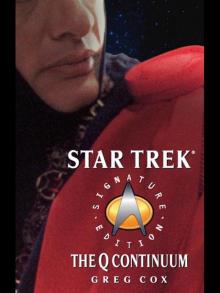 Q-Space
Q-Space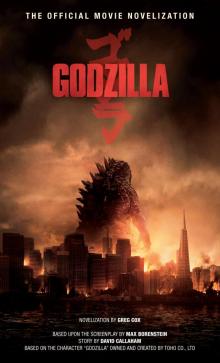 Godzilla - the Official Movie Novelization
Godzilla - the Official Movie Novelization War for the Planet of the Apes: Official Movie Novelization
War for the Planet of the Apes: Official Movie Novelization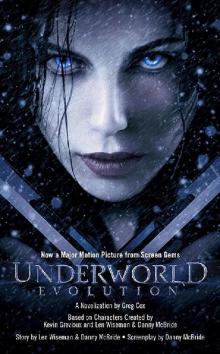 Underworld: Evolution
Underworld: Evolution Underworld
Underworld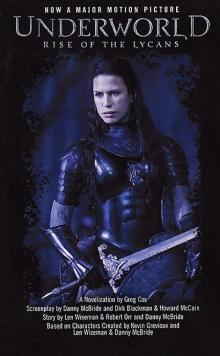 Rise of the Lycans
Rise of the Lycans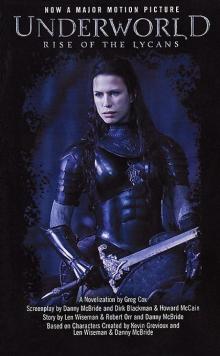 04 - Rise of the Lycans
04 - Rise of the Lycans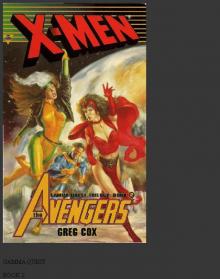 X-Men and the Avengers: Search and Rescue
X-Men and the Avengers: Search and Rescue Child of Two Worlds
Child of Two Worlds Welcome to Promise City
Welcome to Promise City The Librarians and the Mother Goose Chase
The Librarians and the Mother Goose Chase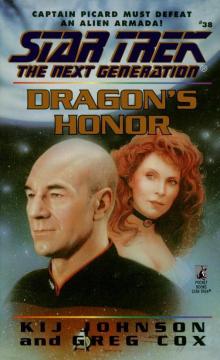 Dragon's Honor
Dragon's Honor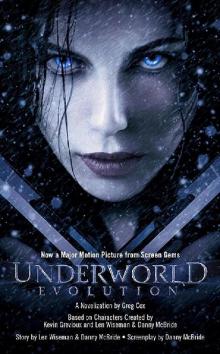 03 - Evolution
03 - Evolution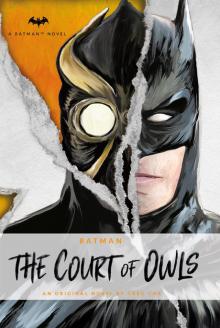 DC Comics novels--Batman
DC Comics novels--Batman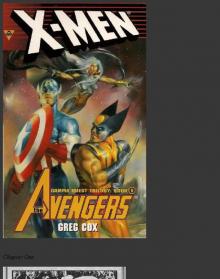 X-Men and the Avengers: Lost and Found
X-Men and the Avengers: Lost and Found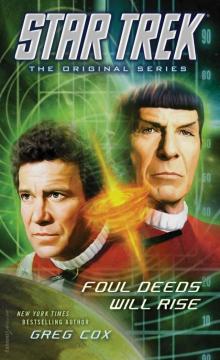 Foul Deeds Will Rise
Foul Deeds Will Rise 02 - Blood Enemy
02 - Blood Enemy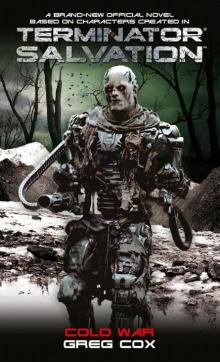 Terminator Salvation: Cold War
Terminator Salvation: Cold War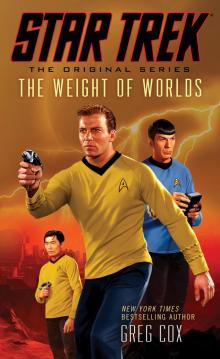 The Weight of Worlds
The Weight of Worlds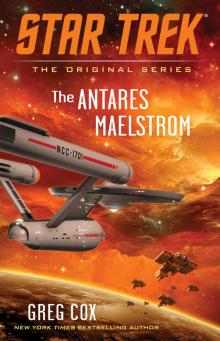 The Antares Maelstrom
The Antares Maelstrom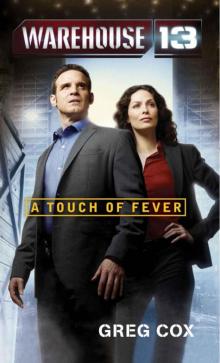 Warehouse 13: A Touch of Fever
Warehouse 13: A Touch of Fever Underworld: Blood Enemy
Underworld: Blood Enemy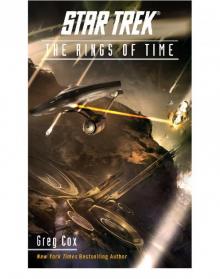 The Rise and Fall of Khan Noonien Singh
The Rise and Fall of Khan Noonien Singh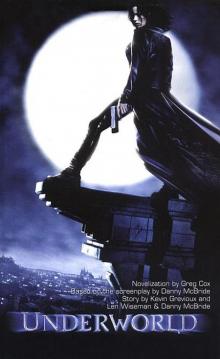 01 - Underworld
01 - Underworld The 4400- the Vesuvius Prophecy
The 4400- the Vesuvius Prophecy Assignment: Eternity
Assignment: Eternity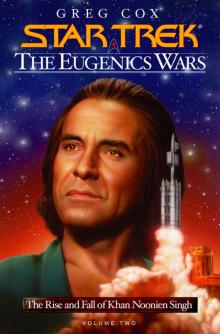 The Eugenics Wars, Vol. 2: The Rise and Fall of Khan Noonien Singh
The Eugenics Wars, Vol. 2: The Rise and Fall of Khan Noonien Singh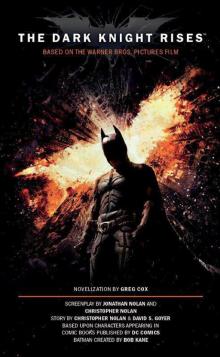 The Dark Knight Rises: The Official Novelization
The Dark Knight Rises: The Official Novelization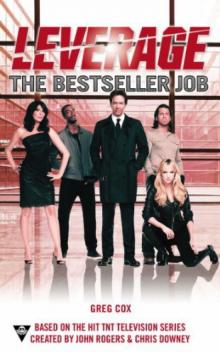 The Bestseller Job
The Bestseller Job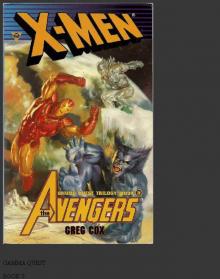 X-Men and the Avengers: Friend or Foe?
X-Men and the Avengers: Friend or Foe?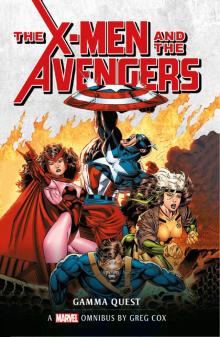 Marvel Classic Novels--X-Men and the Avengers
Marvel Classic Novels--X-Men and the Avengers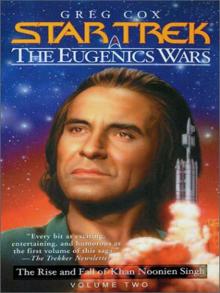 STAR TREK: TOS - The Eugenics Wars, Volume Two
STAR TREK: TOS - The Eugenics Wars, Volume Two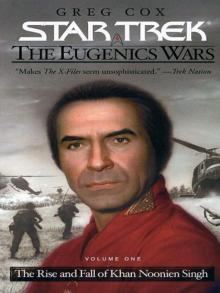 STAR TREK: TOS - The Eugenics Wars, Volume One
STAR TREK: TOS - The Eugenics Wars, Volume One The Black Shore
The Black Shore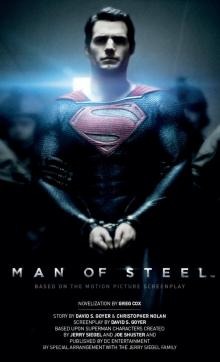 Man of Steel: The Official Movie Novelization
Man of Steel: The Official Movie Novelization Loose ends r-1
Loose ends r-1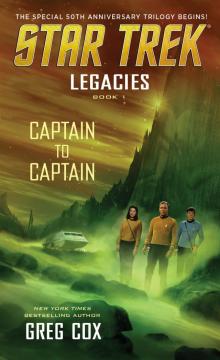 Legacies
Legacies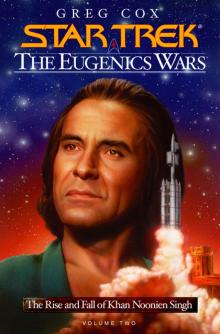 The Eugenics Wars, Volume Two
The Eugenics Wars, Volume Two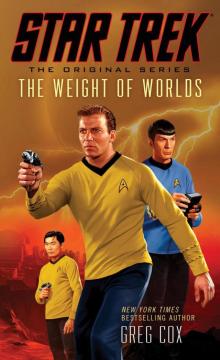 Star Trek: The Original Series - 148 - The Weight of Worlds
Star Trek: The Original Series - 148 - The Weight of Worlds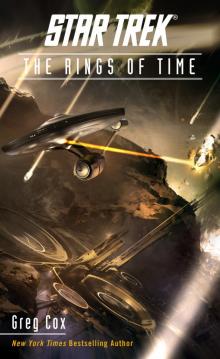 Star Trek: The Original Series: The Rings of Time
Star Trek: The Original Series: The Rings of Time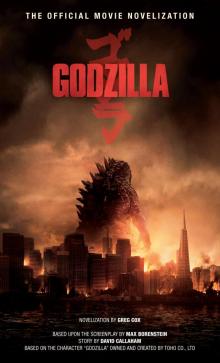 Godzilla--The Official Movie Novelization
Godzilla--The Official Movie Novelization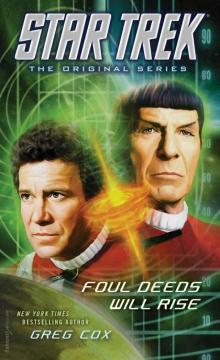 Star Trek: The Original Series - 160 - Foul Deeds Will Rise
Star Trek: The Original Series - 160 - Foul Deeds Will Rise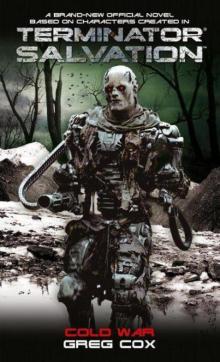 Terminator Salvation: Cold War ts-3
Terminator Salvation: Cold War ts-3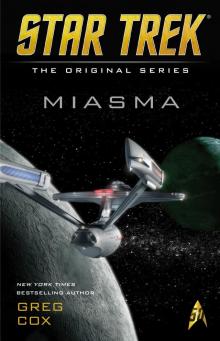 Star Trek: The Original Series: Miasma
Star Trek: The Original Series: Miasma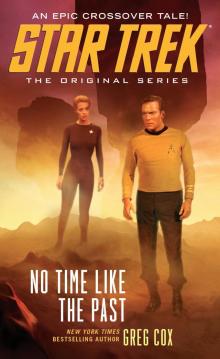 Star Trek: The Original Series: No Time Like the Past
Star Trek: The Original Series: No Time Like the Past Child of Two Worlds (Star Trek: The Original Series)
Child of Two Worlds (Star Trek: The Original Series) THE 4400® WELCOME TO PROMISE CITY
THE 4400® WELCOME TO PROMISE CITY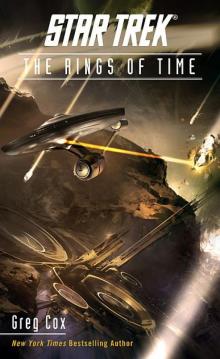 Star Trek: The Original Series: The Rings of Time (star trek: the original series)
Star Trek: The Original Series: The Rings of Time (star trek: the original series)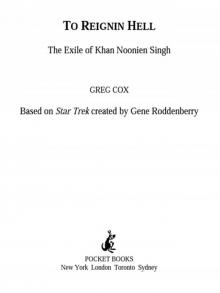 To Reign in Hell: The Exile of Khan Noonien Singh
To Reign in Hell: The Exile of Khan Noonien Singh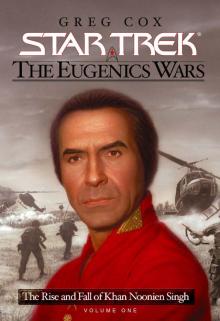 Star Trek: The Eugenics War, Vol. 1
Star Trek: The Eugenics War, Vol. 1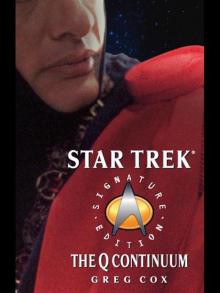 The Q Continuum
The Q Continuum